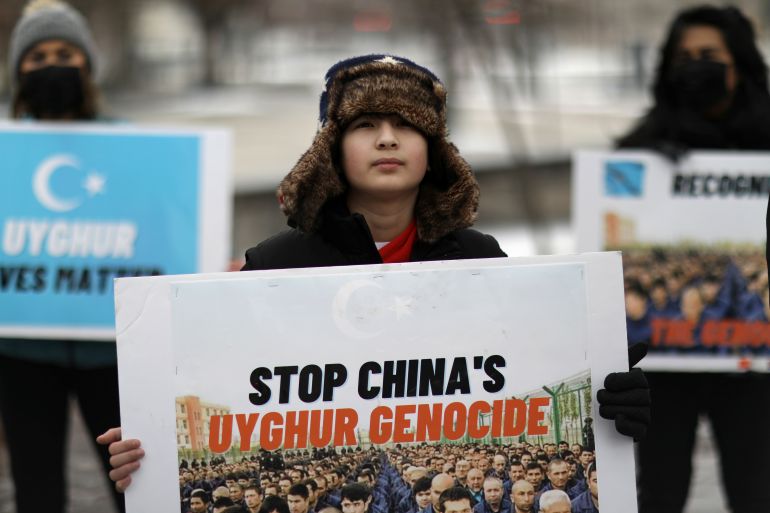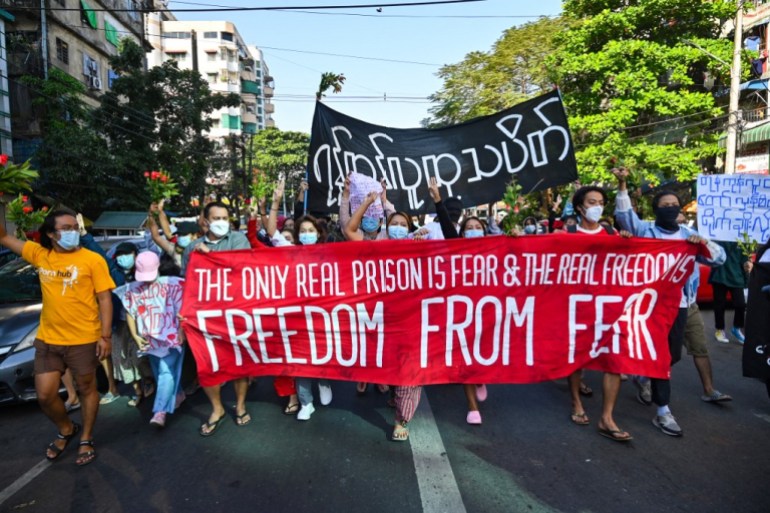US imposes sweeping sanctions on China, Myanmar and North Korea
Washington says it wants to send a message that it will act against those who abuse the power of the state to inflict suffering and repression.

The United States has imposed extensive human rights-related sanctions on dozens of people and entities tied to China, Myanmar, North Korea and Bangladesh, and added a Chinese artificial intelligence company to an investment blacklist.
Canada and the United Kingdom joined the United States in imposing sanctions related to human rights abuses in Myanmar, while Washington also imposed the first new sanctions on North Korea under President Joe Biden’s administration and targeted Myanmar military entities, among others, in action marking Human Rights Day.
Keep reading
list of 3 itemsXinjiang’s ‘architecture of repression’ targets Muslim Uighurs
China committed genocide against Uighur Muslims, tribunal rules
“Our actions today, particularly those in partnership with the United Kingdom and Canada, send a message that democracies around the world will act against those who abuse the power of the state to inflict suffering and repression,” Deputy Treasury Secretary Wally Adeyemo said in a statement.
“On International Human Rights Day, Treasury is using its tools to expose and hold accountable perpetrators of serious human rights abuse.”
The North Korean mission at the United Nations and the Washington embassies of China, Myanmar and Bangladesh did not immediately respond to requests for comment.
The measures are the latest in a raft of sanctions timed to coincide with Biden’s two-day virtual Summit for Democracy, where he announced initiatives to bolster democracy around the world and support for pro-democracy legislation in the United States.
Biden said on Friday that commitments made by some of the more than 100 world leaders at the summit would push back against rising autocracy, fight corruption and promote human rights.
“This is going to help seed fertile ground for democracy to bloom around the world,” he said in a speech closing the summit.
The Treasury on Friday added Chinese artificial intelligence company SenseTime to a list of “Chinese military-industrial complex companies,” accusing it of having developed facial recognition programmes that can determine a target’s ethnicity, with a particular focus on identifying ethnic Uighurs.
Mass detention of Uighurs
As a result, the company will fall under an investment ban for US investors. SenseTime is close to selling 1.5 billion shares in an initial public offering (IPO).
After news of the Treasury restrictions earlier this week, the company began discussing the fate of the planned $767m offering with Hong Kong’s stock exchange, two people with direct knowledge of the matter said.
UN experts and rights groups estimate more than a million people, mainly Uighurs and members of other Muslim minorities, have been detained or imprisoned in recent years in a vast system of camps in China’s far-west region of Xinjiang.
China denies abuses in Xinjiang, but the US government and many rights groups say Beijing is carrying out genocide there.
Abuses in Myanmar, North Korea

The Treasury said it was imposing sanctions on two Myanmar military entities and an organisation that provides reserves for the military.
The Directorate of Defense Industries, one of the entities targeted, makes weapons for the military and police that have been used in a brutal crackdown on opponents of the military’s February 1 coup.
The Treasury also singled out four regional chief ministers, including Myo Swe Win, who heads the military government’s administration in the Bago region, where the Treasury said more than 80 people were killed in a single day in April.
Canada also imposed sanctions against four entities affiliated with the Myanmar military government, while the United Kingdom imposed fresh sanctions against the military.
Myanmar was plunged into crisis when the military overthrew leader Aung San Suu Kyi and her government on February 1, triggering daily protests in towns and cities, and fighting in borderlands between the military and ethnic minority fighters.
Military government forces seeking to crush opposition have killed more than 1,300 people, according to the Assistance Association for Political Prisoners (AAPP) monitoring group.
Human rights campaign group Global Witness said in a statement the measures fell short of focusing on Myanmar’s natural gas industry, a key source of foreign currency for the military, and were “unlikely to materially impact the military junta’s bottom line.”
The Treasury also blacklisted North Korea’s Central Public Prosecutors Office which had been designated, along with the former minister of social security and recently assigned Minister of People’s Armed Forces Ri Yong Gil, as well as a Russian university for facilitating the export of workers from North Korea.
North Korea has long sought a lifting of punishing US and international sanctions imposed over its nuclear weapons programmes and has denounced US criticism of its human rights record as evidence of a hostile policy against it.
The Biden administration has repeatedly called on North Korea to engage in dialogue over its nuclear and missile programmes, without success.
The US State Department on Friday also barred 12 people from travelling to the US, including officials in China, Belarus and Sri Lanka.
Bangladesh’s Rapid Action Battalion and six individuals linked to it were also sanctioned by Treasury for being “an entity that has engaged in, or whose members have engaged in, serious human rights abuse”.